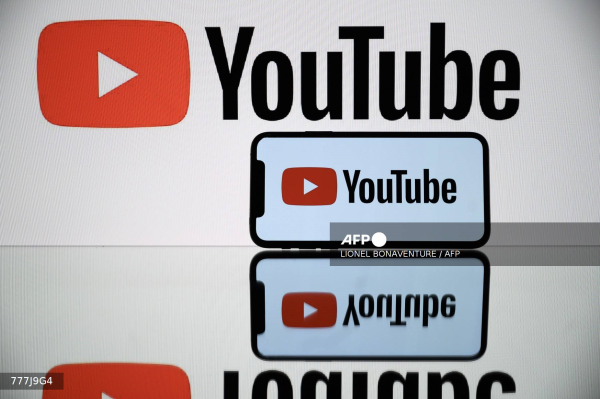KPL
YouTube has agreed to pay US$22 million to settle a lawsuit filed by President Donald Trump after the company suspended his account over the January 6, 2021 attack on the Capitol, according to a court filing Monday.
The online video platform, a subsidiary of Google parent Alphabet, is the latest Big Tech firm to settle with Trump after he lodged legal cases challenging his broad deplatforming after January 6.
(KPL/AFP) YouTube has agreed to pay US$22 million to settle a lawsuit filed by President Donald Trump after the company suspended his account over the January 6, 2021 attack on the Capitol, according to a court filing Monday.
The online video platform, a subsidiary of Google parent Alphabet, is the latest Big Tech firm to settle with Trump after he lodged legal cases challenging his broad deplatforming after January 6.
The US$22 million will go toward Trump's latest construction project at the White House, through a nonprofit called Trust for the National Mall, which is "dedicated to restoring, preserving, and elevating the National Mall, to support the construction of the White House State Ballroom," per a notice of settlement filing in a California federal court.
Besides the US$22 million to Trump's ballroom venture, YouTube agreed to payments of US$2.5 million to a host of other Trump allies, including the American Conservative Union.
Trump reposted a message on his Truth Social platform late Monday saying "this MASSIVE victory proves Big Tech censorship has consequences," adding that the Republican "fought for free speech and WON!"
Major platforms removed Trump after January 6 amid worries he would promote further violence with bogus claims that voter fraud caused his loss to Joe Biden in 2020.

A picture taken on October 5, 2021 in Toulouse shows the logo of Youtube social media displayed by a tablet and a smartphone. YouTube has agreed to pay US$22 million to settle a lawsuit filed by President Donald Trump after it suspended his account over the January 6, 2021 attack on the Capitol, according to a court document released September 29, 2025. The online video platform, a Google subsidiary, is the latest Big Tech firm to settle with Trump after he went to court in July 2021 over his suspension. (Photo by Lionel BONAVENTURE / AFP)
YouTube blocked Trump from uploading new content on January 12, 2021, pointing to "concerns about the ongoing potential for violence." The move came in parallel to actions by Facebook and Twitter that also suspended Trump's ability to post after the January 6 upheaval.
The 79-year-old Republican took social media companies and YouTube to court, claiming he was wrongfully censored.
Trump's lawyers maintained he was kicked off under "non-existent or broad, vague and ever-shifting standards," according to the original July 2021 complaint against YouTube and Alphabet CEO Sundar Pichai.
Trump's posting privileges were curbed after more than 140 police officers were injured in hours of clashes with pro-Trump rioters wielding flagpoles, baseball bats, hockey sticks and other makeshift weapons, along with Tasers and canisters of bear spray. They wanted to block Congress from certifying Biden's win.
- Free speech violation? -
Legal experts have seen Trump's claims against the tech giants as shaky at best, noting that the First Amendment of the US Constitution bars the government, but not a private actor, from restricting speech.
YouTube "is not a state actor and its exercise of editorial discretion over its private service does not implicate Plaintiffs' First Amendment rights," the company said in a December 2021 rebuttal to Trump's brief.
Journalism watchdog group Media Matters decried the settlement, saying it portends continued First Amendment problems under Trump.
"YouTube's capitulation is shameful and shortsighted. Needlessly folding now will only help encourage Trump's efforts to stifle dissent by bringing media and online platforms to heel," the group's president Angelo Carusone told AFP in a statement.
However, tech and media companies have greenlighted settlements to Trump since his return to office as they await action from Washington on major matters affecting their businesses.
Big questions facing YouTube and Google/Alphabet include a trial in Virginia in which a federal court is weighing a request from government lawyers to order the breakup of the search engine giant's ad technology business.
In February, Elon Musk's X settled for about US$10 million in a Trump lawsuit against the company and its former chief executive Jack Dorsey.
In January, days after Trump's inauguration, Meta agreed to pay US$25 million to settle his complaint, with US$22 million of the payment going toward funding his future presidential library.
Media companies have also agreed to settlements with Trump in cases brought by the president that experts see as legally dodgy.
For example, Paramount Global agreed to pay US$16 million to settle a lawsuit brought by Trump over an interview with former vice president Kamala Harris that Trump claimed was edited unfairly. The accord came as Paramount sought approval for its acquisition by Skydance.
The Federal Communications Commission approved the US$8 billion takeover of Paramount in July.
KPL